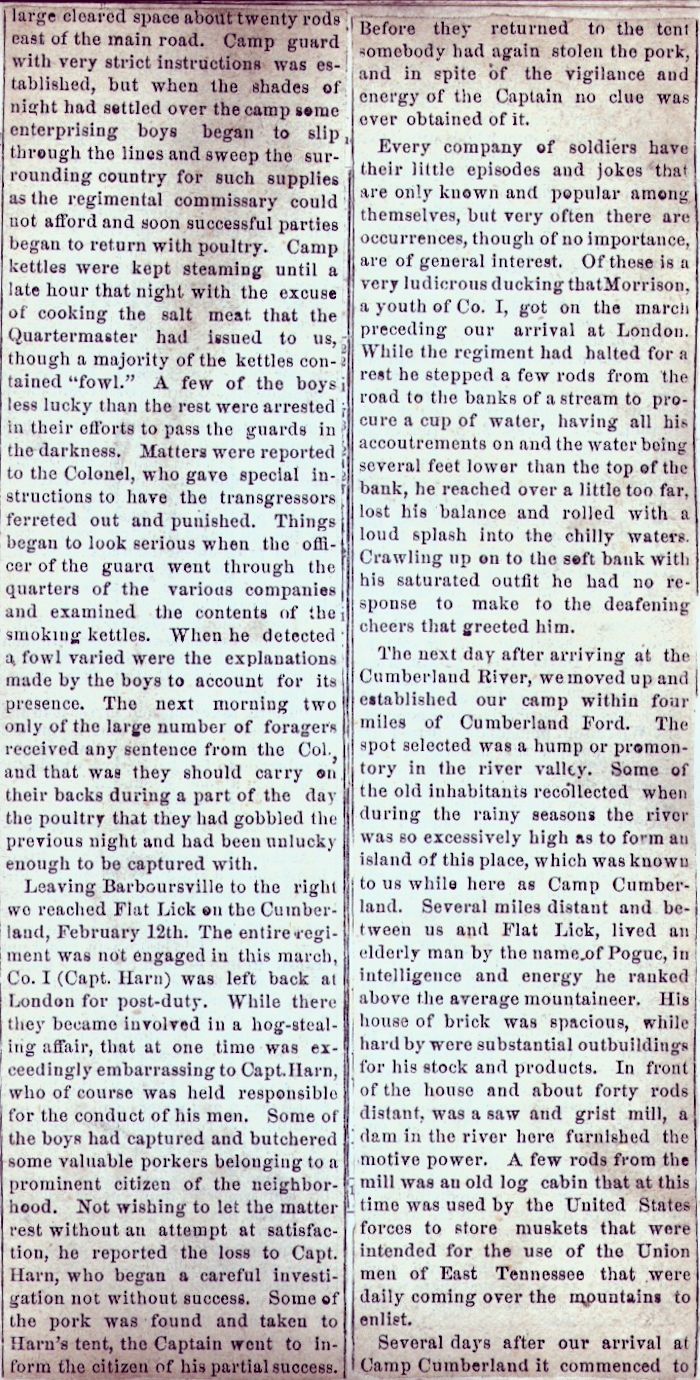| Camp & Field Page 12 | Camp & Field Index Page | 16th OVI Home Page | Camp & Field Page 14 |
The Camp & FieldArticles by Theodore Wolbach |
 Cpl. Theodore D. Wolbach |
The following image is taken from a book titled "Mortality and Statistics of the Census of 1850" in which it is believed retired Captain Rezin H. Vorhes, Company H, pasted over the pages a series of articles written by Cpl. Theodore D. Wolbach, Company E, titled "Camp and Field" and published, by chapter, in the Holmes County (Ohio) Republican newspaper from February 24, 1881 to August 17, 1882. The articles tell the story, in great detail and color, of the 16th OVI, from the inception of the 3-year regiment in October, 1861, through all its camps, battles and marches until it was disbanded on October 31, 1864. The articles pasted in the Vorhes book cover the first 35 chapters, published through October 20, 1881. All the remaining chapters were recently found in a Holmes County library by researcher Rob Garber who obtained copies, performed the transcriptions and provided to this website and which are also presented here, thus providing the complete work by Theodore Wolbach.
Throughout these articles click on the underlined white text for additional details.
The webauthor thanks 16th Ohio descendant Rob Garber for his excellent research on the Camp And Field articles and for performing the tedious digital transcription of those articles found on each page. The transcriptions were made to reflect the original articles verbatim, misspellings and all. Rob is the 3rd great nephew of Capt. William Buchanan, Company F, 16th Ohio, who served in the 90-day regiment as a private, re-enlisting in the three year regiment, and eventually making the rank of Captain of Company F. Thanks Rob!
Page 13 - Chapter 8 - February, 1862
 |
large cleared space about twenty rods east of the main road. Camp guard with very strict instructions was established, but when the shades of night had settled over the camp some enterprising boys began to slip through the lines and sweep the surrounding country for such supplies as the regimental commissary could not afford and soon successful parties began to return with poultry. Camp kettles were kept steaming until a late hour that night with the excuse of cooking the salt meat that the Quartermaster had issued to us, though a majority of the kettles contained Leaving Barboursville to the right we reached Flat Lick on the Cumberland, February 12th. The entire regiment was not engaged in this march, Co. I (Capt. Harn) was left back at London for post-duty. While there they became involved in a hog-stealing affair, that at one time was exceedingly embarrassing to Capt. Harn, who of course was held responsible for the conduct of his men. Some of the boys had captured and butchered some valuable porkers belonging to a prominent citizen of the neighborhood. Not wishing to let the matter rest without an attempt at satisfaction, he reported the loss to Capt. Harn, who began a careful investigation not without success. Some of the pork was found and taken to Harn's tent, the Captain went to inform the citizen of his partial success. |
Before they returned to the tent somebody had again stolen the pork, and in spite of the vigilance and energy of the Captain no clue was ever obtained of it. Every company of soldiers have their little episodes and jokes that are only known and popular among themselves, but very often there are occurrences, though of no importance, are of general interest. Of these is a very ludicrous ducking that Morrison, a youth of Co. I, got on the march preceding our arrival at London. While the regiment had halted for a rest he stepped a few rods from the road to the banks of a stream to procure a cup of water, having all his accouterments on and the water being several feet lower than the top of the bank, he reached over a little too far, lost his balance and rolled with a loud splash into the chilly waters. Crawling up on to the soft bank with his saturated outfit he had no response to make to the deafening cheers that greeted him. The next day after arriving at the Cumberland River, we moved up and established our camp within four miles of Cumberland Ford. The spot selected was a hump or promontory in the river valley. Some of the old inhabitants recollected when during the rainy seasons the river was so excessively high as to form an island of this place, which was known to us while here as Camp Cumberland. Several miles distant and between us and Flat Lick, lived an elderly man by the name of Pogue, in intelligence and energy he ranked above the average mountaineer. His house of brick was spacious, while hard by were substantial outbuildings for his stock and products. In front of the house and about forty rods distant, was a saw and grist mill, a dam in the river here furnished the motive power. A few rods from the mill was an old log cabin that at this time was used by the United States forces to store muskets that were intended for the use of the Union men of East Tennessee that were daily coming over the mountains to enlist. Several days after our arrival at Camp Cumberland it commenced to |
| Camp & Field Page 12 | Camp & Field Index Page | 16th OVI Home Page | Camp & Field Page 14 |